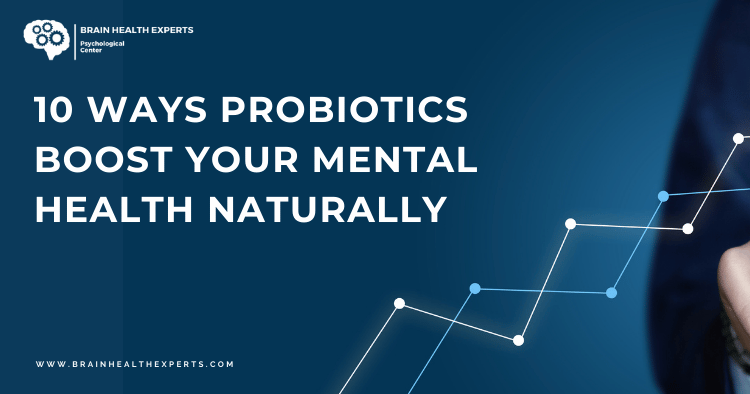Table of Contents
- Introduction
- What Are Probiotics?
- The Gut-Brain Connection
- How Probiotics Affect Mood
- Probiotics and Anxiety Relief
- Probiotics and Depression Management
- Enhancing Cognitive Function
- Probiotics and Stress Reduction
- The Role of Diet in Mental Health
- Conclusion: Incorporating Probiotics into Your Life
Introduction
In recent years, mental health has taken center stage in discussions about overall well-being. While conventional treatments like therapy and medication are commonly prescribed, an exciting area of research is exploring natural methods to enhance mental health. One such method is the use of probiotics. In this article, we’ll delve into 10 ways probiotics can boost your mental health naturally.
What Are Probiotics?
Probiotics are live microorganisms, often referred to as “good” or “friendly” bacteria, that provide health benefits when consumed in adequate amounts. They are primarily found in fermented foods like yogurt, kefir, sauerkraut, and in supplement form. Probiotics help maintain a healthy balance of gut bacteria, which is crucial for various bodily functions, including digestion and immune response. Increasingly, research shows that they also play a vital role in mental health.
The Gut-Brain Connection
The gut and brain are intricately connected through what is known as the gut-brain axis. This bi-directional communication system allows the gut microbiome to influence brain function and mood. Factors such as stress, diet, and lifestyle can alter the composition of gut bacteria, which in turn can affect mental health. This connection is why many researchers believe that improving gut health through probiotics can lead to better mental health outcomes.
“The gut-brain axis is a reminder that our mental and physical health are interconnected. What we eat can significantly impact how we feel.”
Visual Aid: The Gut-Brain Axis
| Aspect | Gut Health | Mental Health |
|---|---|---|
| Microbiome Diversity | Promotes digestion and immunity | Influences mood and cognition |
| Neurotransmitter Production | Produces serotonin and GABA | Affects anxiety and happiness |
| Inflammation Control | Reduces gut inflammation | Lowers risk of depression |
How Probiotics Affect Mood
Research suggests that probiotics may have a positive impact on mood regulation. They can enhance the production of neurotransmitters, which are vital for signaling in the brain. For instance, about 90% of serotonin, a neurotransmitter linked to mood and happiness, is produced in the gut. By improving gut health, probiotics can help maintain optimal serotonin levels, potentially leading to improved mood. This aligns with findings from studies on 10 ways positive thinking boosts emotional well-being, as both probiotics and positive thinking contribute to a healthier mindset.
“Boosting serotonin levels through gut health is a natural way to enhance mood. It’s fascinating how connected our digestive system is to our emotional state.”
Probiotics and Anxiety Relief
Several studies have indicated that specific strains of probiotics, such as Lactobacillus rhamnosus, can help reduce anxiety levels. These probiotics may lower the production of stress hormones like cortisol and increase the availability of calming neurotransmitters. For example, a clinical trial found that participants taking probiotics experienced fewer anxiety symptoms compared to those on a placebo. This is akin to the principles discussed in 10 proven stress management techniques for daily relief, where managing stress is crucial for mental health.
FAQ: Can probiotics help with chronic anxiety?
Answer: While probiotics may help alleviate anxiety symptoms for some individuals, they are not a replacement for professional treatment. It’s always best to consult with a healthcare provider for personalized advice.
Probiotics and Depression Management
The relationship between probiotics and depression is gaining momentum in scientific circles. Research has shown that probiotics may help reduce depressive symptoms, likely due to their ability to produce anti-inflammatory compounds and improve gut health. A notable study found that individuals who consumed probiotics reported a significant decrease in depressive symptoms compared to those who didn’t. This reflects the findings in 10 effective techniques to manage anxiety in daily life, emphasizing the importance of holistic approaches to mental wellness.
“Using probiotics to combat depression illustrates the potential of natural interventions in mental health care. Every small step in gut health may lead to significant improvements in mood.”
Enhancing Cognitive Function
Cognitive function, including memory and focus, can also benefit from probiotics. The gut microbiome plays a role in neurogenesis (the formation of new neurons) and synaptic plasticity (the brain’s ability to adapt). Some studies suggest that probiotics can improve cognitive functions in both healthy adults and those experiencing cognitive decline, paralleling insights from 10 powerful techniques to cultivate a positive mindset which highlight cognitive enhancement as a key to mental health.
Table: Probiotic Strains Linked to Cognitive Benefits
| Probiotic Strain | Cognitive Benefit |
|---|---|
| Lactobacillus helveticus | Enhances memory and learning |
| Bifidobacterium longum | May improve attention span |
| Lactobacillus rhamnosus | Supports overall brain health |
“Improving cognitive function through gut health is a groundbreaking area of study, showcasing the brain’s incredible adaptability and resilience.”
Probiotics and Stress Reduction
Probiotics may also help in managing stress levels. They can reduce the physiological response to stress by modulating the gut-brain axis and promoting a balanced immune response. By lowering inflammation and cortisol levels, probiotics can create a more resilient mental state, similar to the strategies outlined in 10 effective strategies for resilience and stress management.
FAQ: How long does it take for probiotics to affect mood?
Answer: While individual responses vary, some people may notice changes in mood and anxiety levels within a few weeks of starting probiotics. However, for others, it may take several months. Consistency is key!
“Patience is essential when introducing probiotics into your regimen. Like any health journey, the benefits may take time to manifest.”
The Role of Diet in Mental Health
Incorporating probiotics into your diet is essential for reaping their mental health benefits. Consuming a variety of fermentable fibers, known as prebiotics, can also help nourish the probiotics in your gut. Consider foods like garlic, onions, asparagus, and bananas to enhance your gut health. A balanced diet rich in whole foods, healthy fats, and lean proteins can further support mental wellness, echoing the recommendations found in 10 nutritional tips to enhance your sleep quality, as sleep and nutrition are critical for overall mental health.
Suggestions for Probiotic-Rich Foods
- Yogurt: Look for live and active cultures.
- Kefir: A fermented dairy drink packed with probiotics.
- Sauerkraut: Fermented cabbage that’s rich in fiber and probiotics.
- Kimchi: A spicy, fermented vegetable dish loaded with flavor and health benefits.
- Miso: A fermented soybean paste that can be added to soups and sauces.
“A diet rich in probiotics and prebiotics not only nurtures your gut but also lays the foundation for a healthier mind. It’s a delicious way to support your mental health!”
Conclusion: Incorporating Probiotics into Your Life
Probiotics offer a promising avenue for enhancing mental health naturally. By supporting the gut-brain connection, they can help alleviate anxiety, reduce depression, and improve cognitive function. To harness these benefits, consider incorporating probiotic-rich foods into your diet, and consult with a healthcare professional to find the best strains and dosages for your individual needs.
For further reading, you can explore reputable sources like the American Psychological Association and National Institute of Mental Health.
Incorporating probiotics into your daily routine may not only support your gut health but could also lead to a happier, healthier mind. So why not give it a try? Your mental health may thank you!





